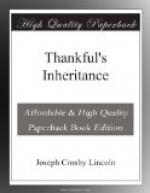Forgiveness was granted. Thankful would have forgiven almost anything just then. The “commodore” announced that he was hungry and he was hurried into the house. The cares of travel had not taken away his appetite. He was introduced to Imogene, at whom he stared fixedly for a minute or more and then asked if she was the “orphan.” When told that she was he asked if her mamma and papa were truly dead. Imogene said she guessed they were. Then Georgie asked why, and, after then, what made them that way, adding the information that he had a kitty that went dead one time and wasn’t any good any more.
The coming of the “commodore” brought a new touch of life to the High Cliff House, which had settled down for its winter nap. Thankful, of course, read Emily’s letter at the first opportunity. Emily wrote that she felt sure Georgie would be company for her cousin and that she had conceived the idea of the boy’s visit before leaving East Wellmouth, but had said nothing because she was not sure mother would consent. But that consent had been granted and Georgie might stay until Christmas, perhaps even after that if he was not too great a care.
He was something of a care, there was no doubt of that. Imogene, whom he liked and who liked him, declared that “that young one had more jump in him than a sand flea.” The very afternoon of his arrival he frightened the hens into shrieking hysterics, poked the fat and somnolent Patrick Henry, the pig, with a sharp stick to see if he was alive and not “gone dead” like the kitten, and barked his shins and nose by falling out of the wheelbarrow in the barn. Kenelm, who still retained his position at the High Cliff House and was meek and lowly under the double domination of his fiancee and his sister, was inclined to grumble. “A feller can’t set down to rest a minute,” declared Kenelm, “without that young one’s jumpin’ out at him from behind somethin’ or ‘nother and hollerin’, ‘Boo!’ Seems to like to scare me into a fit. Picks on me wuss than Hannah, he does.”
But even Kenelm confessed to a liking for the “pesky little nuisance.” Captain Obed idolized him and took him on excursions along the beach or to his own fish-houses, where Georgie sat on a heap of nets and came home smelling strongly of cod, but filled to the brim with sea yarns. And Thankful found in the boy the one comfort and solace for her increasing troubles and cares. Altogether the commodore was in a fair way to become a thoroughly spoiled officer.
With November came the rains again, and, compared with them, those of early September seemed but showers. Day after day and night after night the wind blew and the water splashed against the windows and poured from the overflowing gutters. Patrick Henry, the pig, found his quarters in the new pen, in the hollow behind the barn, the center of the flood zone, and being discovered one morning marooned on a swampy islet in the middle of a muddy lake, was transferred to the old sty, that built by the late Mr. Laban Eldredge, beneath the woodshed and adjoining the potato cellar. Thankful’s orderly, neat soul rebelled against having a pig under the house, but, as she expressed it, “’twas either that or havin’ the critter two foot under water.”




